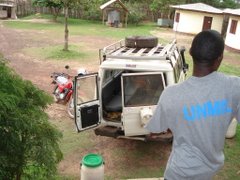I continue to hesitate to capture the nuances of my life here because even though I am living in an English speaking environment I am missing much. If I were to be completely honest I am probably catching about 17% of what is being said. The problem with this is simple: we are speaking the same language – English is Liberia’s national language and everybody here seems to be catching about 72% of what I am saying. This means I can’t ask for a translation; and, one can only say “what?” and “pardon?” so many times before it starts irritating people. At this point I can speak exactly three words in Pelle (the native language for approximately 3 of the 16 Liberian tribes) - Ga a yaillu? (“how much?”) sa na la ma (“show me something”) and am ple (“my stomach is satisfied”). At the end of the day I am left communicating in a fog of incomplete sentences and collective sures and head nods to unknown requests.
The language barrier means I pass the hours ruminating on oblivion – which takes up a surprising amount of time and is something we in the States chronically avoid due to what I believe is a constant state of over-stimulation. Between I-Pods, TVs, cell phones, the internet and golf we are able to be ‘doing” something at all times. Ruminating is left to bride-to-bes who are having a difficult time with soon to be in-laws or table arrangements.
Although there are times it is quite the ego boost to be so recognizable and treated like celebrity, it is not easy. Some people I encounter are looking for a “sponsor.” Sponsor means please give me some money for ________. The requests include payment for everything from school fees to a trip to America or the attainment of a cell phone. Others simply ignore me. Just when I’m feeling disenchanted, different, out of place or unhelpful I have an encounter with a sour-faced adolescent who knows Gwen Stefani or some other pop musician from America. These boys can typically dance to our music with unprecedented grit and grace. I also occasionally meet a well spoken community member who simply wishes to chat. They are all impressed with my ability to sweat and turn instantly pink in this sweltering heat that is sub-Sahara Africa and they often get a kick out of the fact I prefer to walk (rather than ride in the land cruiser) when given the chance.
The psychological wounds are complicated and complex. Many of the women in our groups have survived 3 Liberian wars over the course of 14 years and their children are adjusting to peace rather than warfare. It is not uncommon to hear that women and children were captured by rebel agents and used for forced farm labor or worse. One woman noted that she tried escaping into the bush on multiple occasions. When caught she was forced to watch the killing of her fellow escapees. Most Liberians eventually managed to cross the borders into Sierra Leone or Guinea or went to Monrovia in the late 90s, navigating their way through the bush. Everybody I have met has lost at least one immediate relative and many adolescents are orphans living on their own. People are now returning to their home villages, many with memories of having tried this before only to be welcomed by a new rebel contingent that captured everybody and put them in slave or rape camps. Rebels frequently beat young boys or conscripted then as child soldiers and currently the roads are lined with ex combatants who are being given money and work by a UNICEF reintegration/reeducation program. Most families are still separated with some members living in Monrovia looking for work with all the international NGOs while others remain and work in the local rubber and palm farms.



















No comments:
Post a Comment